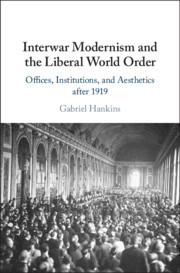Book contents
- Interwar Modernism and the Liberal World Order
- Interwar Modernism and the Liberal World Order
- Copyright page
- Contents
- Acknowledgements
- Introduction
- Chapter 1 The Queer Modernist Origins of Interwar Liberal Order
- Chapter 2 Friends and Enemies
- Chapter 3 The Artist as Clerk
- Chapter 4 Typewriter Fiction at the Secretariat
- Chapter 5 Black Modernist Internationalisms between the Wars
- Coda
- Notes
- Bibliography
- Index
Chapter 4 - Typewriter Fiction at the Secretariat
Paperwork, Feminist Internationalism, and the Mediation of Liberal World Order
Published online by Cambridge University Press: 15 August 2019
- Interwar Modernism and the Liberal World Order
- Interwar Modernism and the Liberal World Order
- Copyright page
- Contents
- Acknowledgements
- Introduction
- Chapter 1 The Queer Modernist Origins of Interwar Liberal Order
- Chapter 2 Friends and Enemies
- Chapter 3 The Artist as Clerk
- Chapter 4 Typewriter Fiction at the Secretariat
- Chapter 5 Black Modernist Internationalisms between the Wars
- Coda
- Notes
- Bibliography
- Index
Summary
The new opportunities, experiences, and limits of liberal internationalist order produced a distinctive kind of feminist-internationalist genre, the internationalist typewriter fiction. The bestselling novelist Rose Macaulay, Hogarth Press intimate Alice Ritchie, journalist and novelist Winifred Holtby, also Virginia Woolf: all wrote of clerks, secretaries, and typists at liberal internationalist offices during the postwar period, for a feminist audience both dependent on and resistant to empire. These fictions contest the familiar modernist trope of the passive “typist home at teatime,” as in Eliot and Conrad, and open up new ways to read the textual traces of liberal governance. Feminist depictions of liberal world order, particularly in the Mandate territories of Africa, allow us to track the complex network of paperwork, romance, and race that organized neo-imperial rule under the Mandate system. Depictions of typists and office work also allow us a new way into reading the imaginative life of the new technical-managerial economic order that rose to increasing prominence between the wars.
Keywords
- Type
- Chapter
- Information
- Interwar Modernism and the Liberal World OrderOffices, Institutions, and Aesthetics after 1919, pp. 107 - 127Publisher: Cambridge University PressPrint publication year: 2019



